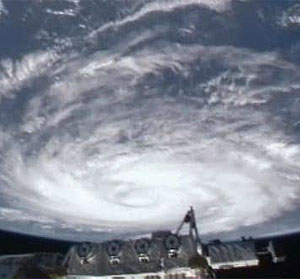 |
| As the International Space Station passed over Hurricane Bill on August 18, astronauts used the stations external cameras to capture spectacular views of the Category 1 hurricane. |
Hurricane Bill is moving up the eastern coast of the United States and there is likelihood it will hit Halifax and the maritime provinces by the weekend. It is also possible that it may blow out to sea.
If the hurricane reaches Nova Scotia, high winds and rainstorms will be experienced. Estimates of what may happen have large margins of error. Current information, updated regularly, can be found at ย or the
Weather predictions for Halifax can be found at .
Should the hurricane continue to approach Nova Scotia, Facilities Management requests that when you leave the university on Friday please:
- Ensure that all operable windows are properly secured;
- Secure (or move inside) any loose items (equipment, chairs, tables etc.) for which you are responsible;
- Take any necessary precautions with electrical equipment and/or systems, as there is a high probability of power outages.
On a more global scale, emergency response recommendations include:
- Monitor local TV and radio stations, text messaging and trusted websites and make sure your cell phone is fully charged;
- Stay away from windows and glass doors. You could be injured by broken glass or flying debris โ€“ in a serious threat of hurricane damage, you may be advised to board over windows or protect them with storm shutters or tape;
- Find shelter in a basement, under a set of stairs, in a closet or a small windowless room preferably away from exterior walls;
- Do not go down to the shoreline, beach or harbour to watch the storm. The high winds create huge waves at sea which, when they reach the shore, may become extremely powerful and suddenly sweep you away;
- Be prepared to evacuate if you live on the coast or in low lying areas near the coast - you may be advised to move inland and to higher ground;
- Minimize the use of telephones, these lines need to be free for official use.
Preparations for a hurricane (including household and car preparations):
What to do during a hurricane:
Ray Ilson is the director of ะยผำฦยม๙บฯฒสฟชฝฑึฑฒฅ's Office of Environmental Health & Safety.
